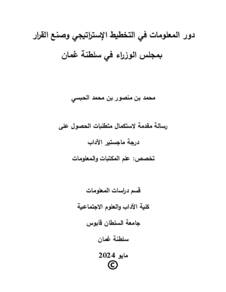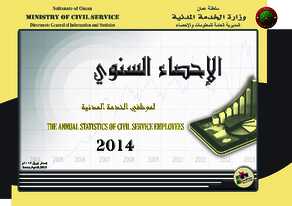وثيقة
دور المعلومات في التخطيط الاستراتيجي وصنع القرار بمجلس الوزراء في سلطنة عمان.
المصدر
رسالة ماجستير
عناوين أخرى
The role of information in strategic planning and decision-making in the Cabinet of Sultanate of Oman
الدولة
عمان
مكان النشر
مسقط
الناشر
جامعة السلطان قابوس
ميلادي
2024
اللغة
العربية
الموضوعات (الاسم)
نوع الرسالة الجامعية
رسالة ماجستير
الملخص الإنجليزي
The study aimed to identify the role of information in strategic planning and decisionmaking in the Sultanate of Oman's Cabinet, as well as the quality of information used, the most
prominent sources used, methods of use, and barriers to access. The study used a qualitative
method, with data collected through semi-structured interviews. The study population was limited
to the General Secretariat of the Council of Ministers. The study sample consisted of 17
respondents to the interviews, including decision-makers, general managers, department
managers, and department heads from the institution.
The study concluded with a set of findings, the most notable of which are: the Cabinet's
decision-making process is based on scientific evidence, all decisions are governed, and official
communications, direct contacts, and regular meetings define communication and coordination
methods. The results also revealed that the Council's strategic planning process is new, but it
has made significant progress towards achieving the appropriate structure, as the targets were
linked to institutional plans with the tenth five-year plan and aligned with Oman Vision 2040. The
number of government agencies that have implemented the process in accordance with the goal
cards has reached fifty. The study found that the Cabinet was distinguished by its ability to access
a variety of information sources. While the methods of using information in electronic systems
are linked to measuring the quality of decision-making through the availability of reliable
information, and identifying methods of collecting, analysing, and extracting information in a
variety of modes.According to the study, the Council's challenges in obtaining and using
information are classified into three types: information-related administrative, and technological.
The establishment of data centres and the use of artificial intelligence in information analysis are
expected to be future trends in strategic planning and decision-making.
The study's recommendations emphasise the importance of developing a mechanism for dealing with decision-making projects that uses modern strategies and anticipates the future. Centralising the institutions by collecting and analysing all information in the national centre for Statistics and Information will strengthen the decision-making process, support human resources, and attract competencies, as well as reviewing and updating legislation related to the confidentiality of documents and information, making information more accessible, and broadcasting it through control panels for decision-makers. Furthermore, it will encourage the use of artificial intelligence tools to aid decision-making and strategic planning.
الملخص العربي
هدفت الدراسة الحالية إلى التعرف على دور المعلومات في التخطيط الاستراتيجي وصنع القرار بمجلس الوزراء في سلطنة عمان ، و تحديد نوعية المعلومات المستخدمة وأبرز المصادر المعتمدة وطرق استخدامها، والتحديات التي يمكن أن تعوق الوصول إليها. واعتمدت الدراسة المنهج الوصفي النوعي، حيث استخدمت المقابلات شبة المقننة كأداة لجمع البيانات، وحصر الباحث مجتمع الدراسة في الامانة العامة لمجلس الوزراء، وبلغ عدد المستجيبين للمقابلة )17( مستجيبا، تمثلت في متخذي القرار ومديري العموم ومديري الدوائر ورؤ ساء الاقسام في المؤسسة -عينة الدراسة.- وتوصلت الدراسة إلى مجموعة من النتائج أبرزها: عملية صنع القرار في مجلس الوزراء مبنية على الادلة العلمية، وكل القرارات الصادرة محوكمة، وحددت طرق التواصل والتنسيق بالمخاطبات الرسمية والاتصالات المباشرة واللقاءات الدورية. وكما أظهرت النتائج بأن عملية التخطيط الاستراتيجي في المجلس حديثة العهد، الا أنها قطعت أشواطا كبيرة في إنجاز الهيكلة المناسبة، إذ تم ربط المستهدفات بالخطط المؤسسية مع الخطة الخمسية العاشرة ومواءمتها مع ر ؤية مان ع ،2040 وبلغ عدد الجهات الحكومية المطبقة للعملية وفق بطاقات الاهداف )50( جهة. وأوضحت الدارسة بأن مجلس الوزراء تميز بالقدرة على الوصول لمصادر المعلومات المختلفة. في حين تمثلت طرق استخدام المعلومات في الانظمة الالكترونية وارتباطها بقياس جودة القرار من خلال وفرة المعلومات الموثوقة، وتحديد طرق جمع المعلومات وتحليلها واستخ ارج المعلومة بعدة أنماط مختلفة. وأظهرت الدراسة أن التحديات التي يواجهها المجلس في الحصول على المعلومات والاستفادة منها تتمثل في ثلاثة أنواع: تحديات متعلقة باستخدام المعلومات، وتحديات إدارية، وتحديات تقنية. وخلصت الدراسة إلى مجموعة من التوصيات، أهمها: تطوير آلية التعاطي مع مشاريع القرارات باستخدام استراتيجيات حديثة واستشراف المستقبل، والعمل على مركزية المؤسسات في جمع المعلومات وتحليلها في المركز الوطني لإلحصاء والمعلومات، وتعزيز وحدة دعم اتخاذ القرار بالكوادر البشرية واستقطاب الكفاءات، ومراجعة التشريعات المتعلقة بسرية تداول الوثائق والمعلومات وتحديثها، وتسهيل إتاحة المعلومات وبثها عبر لوحات تحكم لمتخذي القرار، والاهتمام بتوظيف أدوات الذكاء الاصطناعي في دعم صنع القرار والتخطيط الاستراتيجي.
قالب العنصر
الرسائل والأطروحات الجامعية


